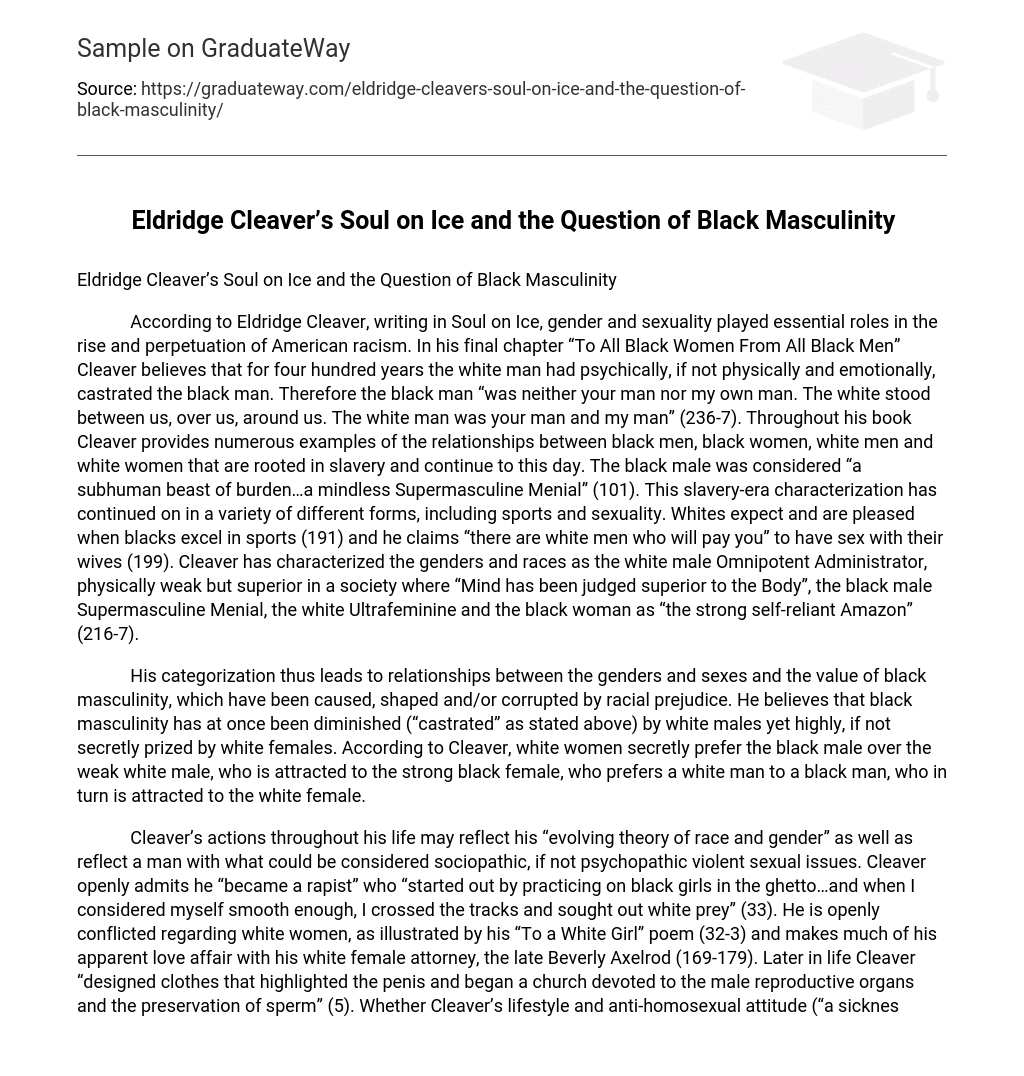According to Eldridge Cleaver, writing in Soul on Ice, gender and sexuality played essential roles in the rise and perpetuation of American racism. In his final chapter “To All Black Women From All Black Men” Cleaver believes that for four hundred years the white man had psychically, if not physically and emotionally, castrated the black man. Therefore the black man “was neither your man nor my own man. The white stood between us, over us, around us. The white man was your man and my man” (236-7). Throughout his book Cleaver provides numerous examples of the relationships between black men, black women, white men and white women that are rooted in slavery and continue to this day. The black male was considered “a subhuman beast of burden…a mindless Supermasculine Menial” (101). This slavery-era characterization has continued on in a variety of different forms, including sports and sexuality. Whites expect and are pleased when blacks excel in sports (191) and he claims “there are white men who will pay you” to have sex with their wives (199). Cleaver has characterized the genders and races as the white male Omnipotent Administrator, physically weak but superior in a society where “Mind has been judged superior to the Body”, the black male Supermasculine Menial, the white Ultrafeminine and the black woman as “the strong self-reliant Amazon” (216-7).
His categorization thus leads to relationships between the genders and sexes and the value of black masculinity, which have been caused, shaped and/or corrupted by racial prejudice. He believes that black masculinity has at once been diminished (“castrated” as stated above) by white males yet highly, if not secretly prized by white females. According to Cleaver, white women secretly prefer the black male over the weak white male, who is attracted to the strong black female, who prefers a white man to a black man, who in turn is attracted to the white female.
Cleaver’s actions throughout his life may reflect his “evolving theory of race and gender” as well as reflect a man with what could be considered sociopathic, if not psychopathic violent sexual issues. Cleaver openly admits he “became a rapist” who “started out by practicing on black girls in the ghetto…and when I considered myself smooth enough, I crossed the tracks and sought out white prey” (33). He is openly conflicted regarding white women, as illustrated by his “To a White Girl” poem (32-3) and makes much of his apparent love affair with his white female attorney, the late Beverly Axelrod (169-179). Later in life Cleaver “designed clothes that highlighted the penis and began a church devoted to the male reproductive organs and the preservation of sperm” (5). Whether Cleaver’s lifestyle and anti-homosexual attitude (“a sickness just as are baby-rape and wanting to be president of General Motors” (136)) is consistent with his belief in “the attainment of a Unitary Sexual Image, the take-off stage for the Apocalyptic Fusion” is certainly debatable. According to Maxwell Geismar, writing the 1999 introduction Cleaver’s version of race and gender
are the exotic myths and fabricated legends of a racial caste system embodied in a hypocritical class society. These are the satiric fantasies hovering around something which might be called the ‘essential miscegenation’ as the missing key, the unthinkable solution to the American race problem. (17-18)
As with his race-gender pronunciations and theories, much of what Cleaver says must be taken in the context of the era when it was written. That is not to say everything he writes must be discarded or taken in context. There are several examples why Soul on Ice will remain a classic window to the sixties as well as to a man with a profound sense of the racial inequities he certainly did not ask to be a part of. Although I do not agree with everything he says, I firmly believe his words should be taken in light of his very profound belief: “the price of hating other human beings is loving oneself less” (36).
Volumes have been written regarding some of the dynamic improvements and disgusting failures of racial relationships since publication of Soul on Ice. However Cleaver is able to point out two specific points that existed then and I believe unfortunately persist today. Cleaver states in prison “the lines leading into the mess halls are integrated. But once inside the mess hall blacks sit at tables by themselves and whites sit with themselves or with the Mexicans” (67). Today that form of “voluntary” segregation is still in evidence in prisons, schools, and workplace cafeterias across the country. Another point is what Cleaver refers to as “tabbing”: “to tab whatever the blacks did with the prefix ‘Negro’…Negro literature, Negro athletes…” (103). It is unchanged today with the substitution ‘black’ or ‘African-American’ for ‘Negro’. Some is proper identification, such as ‘African-American cultural studies’ but much is prejudicial, often used by whites as if they are surprised, such as “I heard the most fantastic black guitarist the other day.” Prejudice will unfortunately always plague us, but Cleaver offers hope: “If a man like Malcolm X could change and repudiate racism, if I myself and other former Muslims can change, if young whites can change, then there is hope for America” (106). There is much to be done and Cleaver gives us a lot of reasons to keep trying.
Works Cited
Cleaver, Eldridge. Soul On Ice. New York: Dell Publishing, 1999.





